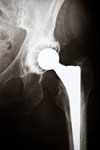ASR Hip Lawsuit Charges DePuy With Failure to Warn
 A Georgia woman who suffered hip implant failure and was forced to undergo revision surgery has filed a lawsuit charging that manufacturer DePuy Orthopaedics knew of the ASR hip’s flaws before her initial surgery but did not warn her, her physician, the public, or the medical community. The lawsuit was filed against DePuy, parent company Johnson & Johnson, and implant designer Thomas P. Schmalzried, M. D., on May 8, 2012 in the Superior Court of California, Los Angeles County.
A Georgia woman who suffered hip implant failure and was forced to undergo revision surgery has filed a lawsuit charging that manufacturer DePuy Orthopaedics knew of the ASR hip’s flaws before her initial surgery but did not warn her, her physician, the public, or the medical community. The lawsuit was filed against DePuy, parent company Johnson & Johnson, and implant designer Thomas P. Schmalzried, M. D., on May 8, 2012 in the Superior Court of California, Los Angeles County.
According to the DePuy lawsuit, the plaintiff, Virginia Van Ryswyk of Georgia, received the hip transplant on April 2, 2007. She subsequently began to experience pain and discomfort in her hip. Over time, the pain increased, and it became difficult for her to walk, stand up from a sitting position, or move her legs. Eventually she had to undergo revision surgery to replace the hip.
DePuy received hundreds of complaints before recalling ASR hip
According to the lawsuit, DePuy launched the ASR hip model in 2005 and over the next three years received more than 300 reports of implant failure. “Consequently, DePuy was fully aware that the ASR Hip Implant Device was defective,” Ryswyk’s lawsuit alleges.
In August 2010, three years after Van Ryswyk’s original hip replacement surgery, the type of ASR hip model that Van Ryswyk had received was taken off the market in a voluntary DePuy implant recall.
ASR hip used metal-on-metal construction
Van Ryswyk’s lawsuit notes that the ASR hip used both a metal ball and a metal acetabular cup, rather than the plastic cup used by other implants. The metal-on-metal construction is problematic because over time, the friction of metal on metal and daily wear and tear can cause metal fragments to rub off and get into the patients tissues or bloodstream, causing metallosis. In addition, as the hip wears away, it can become loose, causing the patient pain, discomfort, and difficulty standing or walking.
In a recent study, British researchers found that nearly 6 percent of metal-on-metal implants fail within five years, compared to only 1.7 to 2.3 percent of ceramic or plastic joints.
Ryswyk is seeking exemplary and punitive damages in excess of $25,000.
[SmartLink depuyhiplawsuit]

